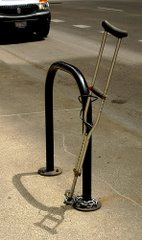We talk a lot about "disability" but what is it? It is often hard to group all “disabled” people together because their disabilities are so different, from blindness to autism to paralysis and beyond. But we still say “disability” to refer to all these things, so what do we mean?
I think that disability is generally understood by society as having restricted abilities in relation to the general population. Once a certain large percentage of people can be expected to have a certain ability, those without it are considered disabled.
What strikes me is how subjective an idea this is: that the only thing defining a segment of the population differently and separating "them" from "us" is their place on a bell curve of ability. The disabled will always be categorized in relation to everyone else.
If everyone could play tennis and then someone came along who didn’t have a racket, they would be considered less then everyone else. “Isn’t it a shame that they can’t play tennis like the rest of us? I wonder what it must be like to not have a racket?” we would say.
The same goes for non-physical abilities. If we lived in a society where language was always sung, the poor few who were tone deaf would have a pretty hard time fitting in. “It’s a pity, no one can understand him,” we would say.
Or to be more cerebral, what if we lived in a society where almost everyone was good at math. “Did you see how she forgot the quadratic equation? How embarrassing!”
And disability need not be seen as a lack of ability either, but could be seen as a difference. In Ireland, girls with red hair are still to this day are perceived negatively. What if we lived in a world where those with Red hair were treated differently from others and not given the same opportunities even though they could function just as well as their brunette counterparts? (This video gives a funny idea of what that would look like. Red heads are called Gingers in the UK.)
These examples give some context to how disability is such a fragile classification. In reality we are all given a different set of abilities at birth, both physical and mental. Slowly with age we will loose them. Disability is therefore a concept that everyone has to grasp at some point in relation to themselves. We will not always be able to do what we once did. And we will also not always be able to do the things that other people can do.
I think a lesson I see in people with disabilities is that everyone has limitations. They unfortunately have to wear their limitations on their sleeves so that everyone can see them; whereas I can pretend my limitations don’t exist or can easily hide them. So to do away with the word disability, we could all say that limitations suck, whatever they are. That’s something we all have in common.
ABLED
This blog is about reconciling the two worlds of disability understanding. On one side are the strong voices of activists in the disability community. On the other is the well meaning but naïve/ ignorant able bodied population who see disability as something pitiable. As an able bodied person who has realized the very compelling and interesting arguments about society and life coming from the disability community, I am compelled to referee the exchanges between the two sides. Often times it seems that everyone is speaking so loudly and with such great conviction that the other doesn't even listen. Since I am not personally motivated by either side, I can weigh both sides of the arguments and hopefully facilitate an open and accepting space for both sides to express themselves and learn about each other. Please join the discussion!
Subscribe to:
Post Comments (Atom)

1 comment:
Hey Frogger,
I'm with this for most of the way down but loose it at the end around the "limitations".
I believe that there is a deeper core issue involved. It's not just the fact that I can't play tennis because I don't own a racket. It's often more like- I can't play tennis because no one will sell or lend me a racket.
Very similar to situations involving accessibility- I could do it if I could get at it!. Or reasonable job accommodation, where some work place mods would hit the spot but the man isn't going for it. So, are you limited and disabled? Or, are you being limited and disabled?
Disability and limitations are very fluid words. They can easily morph when you apply who, when, where, and how-come to them.
Back to limitations. I don't think it's about limitations that everyone may have but more about the abilities that everyone has. Aside from one's own desires, what is standing in the way of ability and why is it there?
Oh, easy on the "They unfortunately have to wear their limitations" language. It's no longer considered "unfortunate" by those doing the wearing.
Nice to see a nice new blog sans clutter. Best of luck with it.
Post a Comment